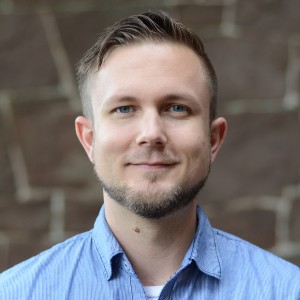BIOL310 Students Collaborate on Scientific Journal Article


More than 20 Wesleyan students — including three former first-years — are co-authors of a research manuscript accepted for publication in a prestigious biology research journal. The paper focuses on a species of fruit fly that has evolved, and has the ability to ingest a toxic plant.
The paper, which is forthcoming in G3: Genes | Genomes | Genetics, is the result of a study completed by BIOL310 Genomics Analysis students. Course instructor and co-author Joseph Coolon, assistant professor of biology, created BIOL310 to provide students a course-based research experience focused on measuring gene expression.
“Because the students in the course and in my lab collaborated on all the analysis, interpretation, and wrote the paper, all 23 students are co-authors of the published manuscript,” Coolon said. “G3 is a well-known and highly reputable journal for publishing in my field and I am honored to have been able to publish there, especially given the number of undergraduates that are now published authors in such a great journal.”
Authors included Coolon and Wesleyan students Stephen Lanno (graduate student), Sara Gregory ’19, Serena Shimshak ’17, Maximilian Alverson ’17, Kenneth Chiu ’19, Arden Feil ’18, Morgan Findley ’18, Taylor Forman ’18, Julia Gordon ’18, Josephine Ho ’16, MA ’17, Joanna Krupp, Ivy Lam ’20, Josh Lane ’19, Samuel Linde ’20, Ashley Morse ’19, Serena Rusk ’20, Robie Ryan ’17 (graduate student), Avva Saniee ’17, Ruchi Sheth ’16 MA ’17, Jennifer Siranosian ’17, Lalitpatr Sirichantaropart ’18, Sonya Sternlieb ’18 and Christina Zaccardi ’17.
Lam, Linde and Rusk were first-year students at the time. “Having a frosh published in a scientific journal is exceptionally rare” Coolon said.

“I honestly can’t believed I am part of a published paper,” said Lam, who is currently part of Coolon’s research group and plans to double major in neuroscience and biology. “It is definitely encouraging and I am hoping to use this experience and the knowledge that I gained from the process to further my research at school. We are going to use the results from this paper for a new project. Hopefully, we will be able to find some interesting data!”
The manuscript, titled “Transcriptomic analysis of octanoic acid response in Drosophila sechellia using RNA-sequencing,” is based on a semester-long study on the fruit fly D. sechellia, which unlike other fruit fly species, can eat the fruit of a toxic plant called noni. All other closely-related fruit flies die within minutes after eating noni.
To identify the genes that may be responsible for evolved resistance to toxins in D. sechellia, the class used genomics analysis focused on measuring genome-wide gene expression with high-throughput sequencing, an approach called RNA-sequencing.
Using this method, the students of BIOL310 identified genes that respond to toxin exposure and may contribute to altered toxin resistance in D. sechellia. Of those candidates, one called Osiris 6, which is a gene of unknown function that was recently shown by the Coolon Lab to influence toxin resistance in fruit flies, may be critical for D. sechellia evolved resistance to the toxins in noni.
“Quite excitingly, genes in the Osiris family represent a new class of genes that may play a role in insect evolved resistance to both natural and man-made toxins like pesticides,” Coolon said. “Further study of this class of genes will provide valuable information about how insect pests evolve resistance to pesticides more generally, which is a really important problem for feeding the worlds population.”
Coolon wanted to provide students with an opportunity to participate in scientific discovery where they get hands-on experience in doing real science. They also are introduced to computer programming, an essential skill for life scientists.
“The students learn through engaging with never-before analyzed data where I teach them how to use cutting edge genomics analysis techniques as well as bioinformatics and computational tools through a discovery-based independent study,” he said. “They’re not only learning about past and present genomic studies, they are participating in the generation of new knowledge that future science students will hopefully study one day, which both I and the students are really excited about.”
The data generated for the course was paid for in part by a Center for Pedagogical Innovation Grant Coolon received in 2016.

